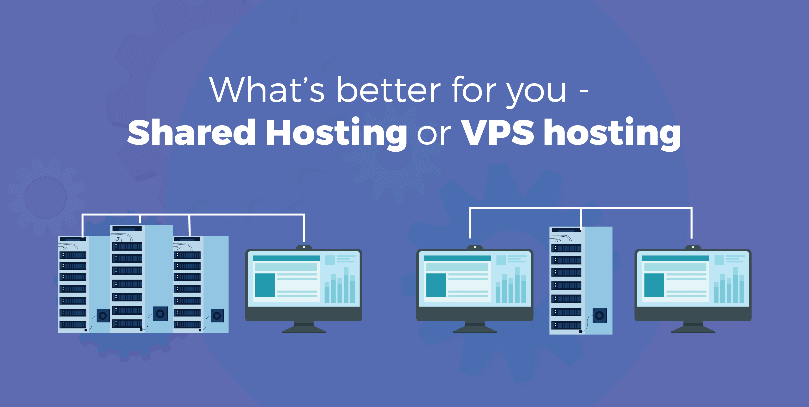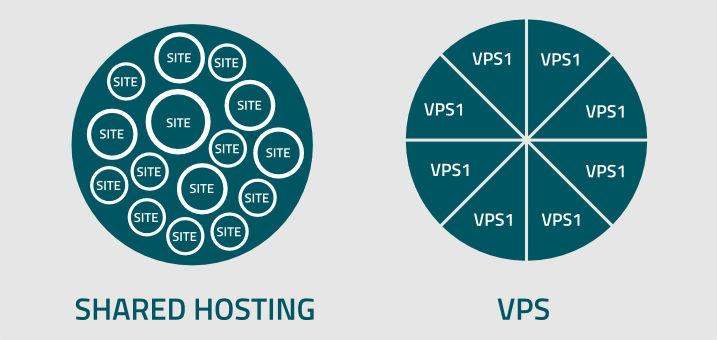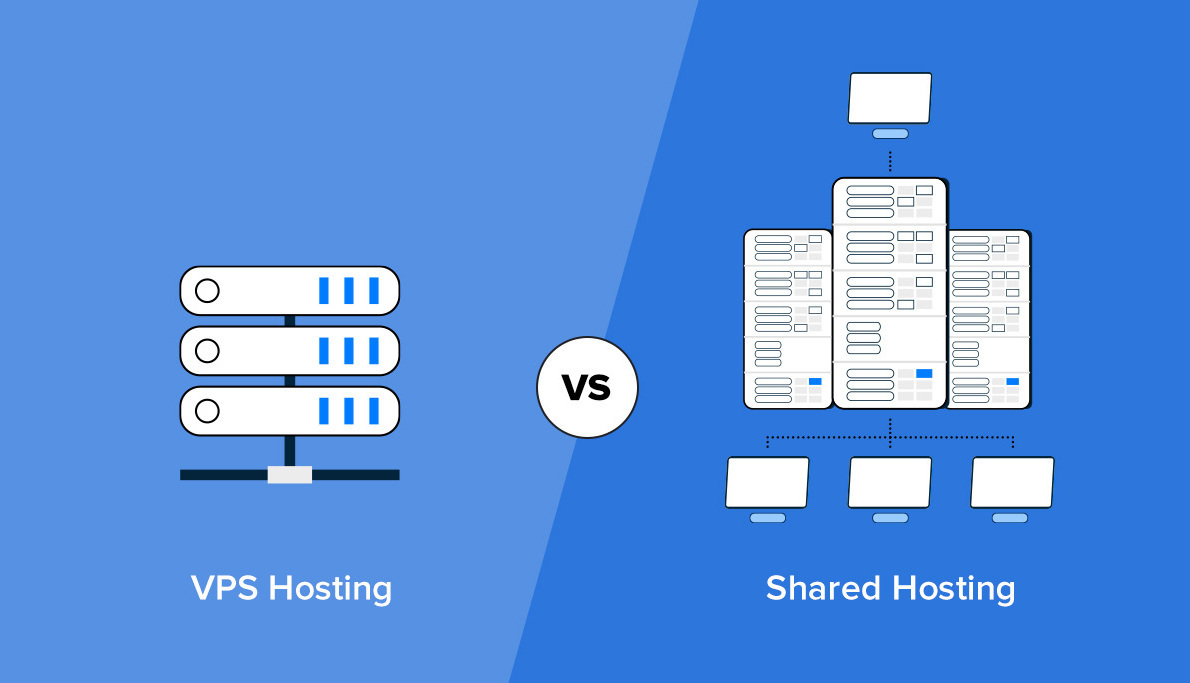The choice between Shared Hosting and Virtual Private Server (VPS) is always a crucial decision for website owners. Both options offer advantages and cater to different needs. Understanding their differences and functionalities is key to selecting the right hosting solution that aligns with your website's requirements.
Shared Hosting
Shared Hosting is an economical option, making it popular among small businesses, bloggers, and individuals launching their first websites. Shared Hosting offers user-friendly control panels and basic functionalities for beginners.
However, the shared nature of resources in this hosting type can occasionally lead to performance limitations. When one website experiences high traffic or resource usage, it can impact the performance of other sites on the same server. Despite this limitation, Shared Hosting remains an excellent starting point for those on a budget.
VPS (Virtual Private Server)
VPS (Virtual Private Server) hosting provides a more scalable solution compared to Shared Hosting. It operates on a physical server into multiple virtual servers, each functioning independently. VPS hosting offers dedicated resources to users, ensuring greater control, customization options, and improved performance compared to Shared Hosting.
In a VPS environment, users have a variety of resources, including CPU cores, RAM, and storage. This provides a more consistent performance even during high traffic periods and provides a level of isolation from the activities of other users on the server. VPS hosting balances between being affordable and having enhanced functionalities, making it suitable for businesses experiencing moderate to high traffic or requiring specific configurations and control.

What is Shared Hosting?
Shared hosting refers to a type of web hosting where multiple websites are hosted on a single server and share its resources. It's a cost-effective solution where the server resources like CPU, RAM, storage, and bandwidth are distributed among various websites hosted on that server.
In a shared hosting environment, each website has its own space within the server, but they all share the same pool of resources. This setup allows hosting providers to offer affordable plans as the cost of maintaining and operating the server is distributed among multiple users.
Shared hosting is an ideal starting point for individuals, small businesses, bloggers, or those with limited technical knowledge who are entering the online space. It usually comes with user-friendly control panels that simplify website management tasks such as setting up emails, installing applications, and managing files.
While shared hosting offers an affordable and easy-to-use solution, there are some limitations. Since resources are shared among multiple websites, heavy traffic or resource usage from one website can potentially impact the performance of other websites on the same server.
Pros and cons
Pros of Shared Hosting:
- Shared hosting plans are budget-friendly, making them an ideal choice for individuals and small businesses with limited budgets.
- Shared hosting often comes with user-friendly control panels, making it accessible for those new to website management and hosting.
- It's easy to set up and get started with shared hosting, requiring minimal technical knowledge or expertise.
- The hosting provider handles server maintenance, security updates, and technical issues, reducing the workload for website owners.
- Shared hosting plans often offer easy upgrade options, allowing users to scale up resources if their website grows.
Cons of Shared Hosting:
- Resources like CPU, RAM, and bandwidth are shared among multiple websites on the same server, potentially leading to performance issues during high traffic.
- Since multiple websites share resources, the performance of your website can be affected by the activities of other sites on the server.
- Shared hosting may have limitations in terms of customization and configuration options compared to more advanced hosting types.
- Vulnerabilities in one website can potentially affect other sites on the same server, although good hosting providers implement security measures to minimize these risks.
- Websites expecting high traffic or needing dedicated resources may outgrow the limitations of shared hosting.

Best use cases
Personal Blogs or Portfolios
Shared hosting is an excellent choice for individuals starting personal blogs, online portfolios, or resume websites. These typically have low to moderate traffic and resource requirements, making shared hosting a cost-effective solution.
Small Business Websites
Small businesses with informational websites, local services, or niche markets that don't expect high traffic can benefit from shared hosting. It's a budget-friendly option to establish an online presence without investing heavily in hosting costs.
Startups and New Ventures
For startups or newly launched businesses testing the waters or focusing on early-stage development, shared hosting is the perfect solutiont. It allows them to allocate resources to other critical aspects of the business while having a functional online presence.
Learning and Experimentation
Shared hosting is ideal for individuals or students learning web development, design, or experimenting with different CMS (Content Management Systems) like WordPress, Joomla, or Drupal. Its user-friendly interface and affordable pricing make it suitable for educational purposes.
Low-Traffic Websites or Landing Pages
Websites designed for specific events, campaigns, or temporary purposes, expecting low traffic, can leverage shared hosting. Landing pages or promotional sites that don't require heavy resources can benefit from the cost-effectiveness of shared hosting.
Shared Hosting Vs VPS: Key Differences
When it comes to hosting your website, the choice between Shared Hosting and VPS can significantly impact its performance, security, customization, and ultimately, your budget. Let's explore the core differences between these hosting options:
Performance
Shared Hosting: Shared hosting allocates resources between multiple websites on the same server. While it's cost-effective, theis can occasionally lead to performance fluctuations, especially during peak traffic periods or more intensive tasks. Your website's performance might be influenced by the activities of other websites on the server.
VPS Hosting: VPS hosting offers dedicated resources within a virtual environment. Each VPS operates independently with its allocated CPU, RAM, and storage. This isolation ensures consistent performance, even during high traffic periods. VPS hosting tends to deliver superior performance compared to shared hosting, especially for websites experiencing moderate to high traffic.
Security
Shared Hosting: Security on shared hosting depends on the provider's measures to isolate websites and prevent vulnerabilities. However, since multiple websites share the same server, security risks arise if one site faces security breaches or malware, potentially affecting others on the server.
VPS Hosting: VPS hosting provides a higher level of security due to its isolated environment. The independent compartments ensure that security breaches or issues on one VPS don't impact others. Users have more control over security configurations, making it a more secure option for sensitive data or critical applications.
Customization and Control
Shared Hosting: Shared hosting usually offers limited customization options and control over server settings. Users have access to a shared control panel but might not have the flexibility to customize server configurations.
VPS Hosting: VPS gives users greater control and customization capabilities. It operates like a standalone server, allowing users to configure settings, install custom applications, and change server resources based on specific requirements.
Pricing
Shared Hosting: Shared hosting plans are generally cheaper, catering to those with budget constraints or starting small websites. It's an affordable option for newbies in web hosting, offering cost-effective solutions for beginners.
VPS Hosting: VPS hosting tends to be pricier than shared hosting due to its dedicated resources and capabilities. While it offers superior performance and customization, it`s more expensive.

Factors to Consider When Choosing Between Shared Hosting and VPS
Website Traffic and Scalability
Shared Hosting: If you anticipate moderate traffic and are starting small, shared hosting might be your best option. However, as your website traffic grows, shared hosting's limitations in handling sudden traffic spikes might be a problem for your site`s performance. Consider the potential for scalability and whether shared resources can accommodate your future growth. VPS Hosting: VPS offers scalability and flexibility, allowing you to scale resources as your website expands. It's suitable for websites expecting significant traffic variations or those with steady growth.
Technical Expertise
Shared Hosting: Shared hosting is user-friendly and requires minimal technical knowledge. It's an excellent choice for beginners or those who prefer a hands-off approach to server management. VPS Hosting: VPS demands a certain level of technical expertise for server configuration, software installations, and maintenance. Users have more control but need to be comfortable with managing server settings or have access to technical support.
Budget Constraints
Shared Hosting: Shared hosting plans are budget-friendly, making them ideal for individuals or small businesses with limited budgets. It offers cost-effective solutions to establish an online presence without financial commitments. VPS Hosting: VPS tends to be pricier due to dedicated resources and enhanced functionalities. It's a more significant investment, suitable for those who would like to set aside a higher budget for better performance, control, and scalability.
Specific Website Needs
E-commerce or resource-intensive websites: If your website involves e-commerce transactions, handles sensitive data, or requires specific configurations and enhanced security measures, VPS might be more suitable. It provides the isolation and resources necessary for better performance and security.
Blogging or informational sites: For personal blogs, informational websites, or sites with low to moderate traffic, shared hosting offers a cost-effective solution. It provides the basics required for establishing an online presence without the need for extensive resources.
Conclusion
The decision between Shared Hosting and VPS revolves around several aspects that impact a website's functionality, growth potential, and budget. Shared hosting, with its user-friendly interface and affordability, serves as an excellent starting point for beginners or smaller websites with modest traffic.
However, its limitations in scalability and potential performance issues during traffic spikes need to be concidered. On the other hand, VPS offers scalability, dedicated resources, and consistent performance, making it suitable for evolving websites or those requiring specific configurations and control. Yet, VPS demands a higher level of technical expertise and comes with a higher price tag, making it suitable for for advanced users.
In the end, the choice between Shared Hosting and VPS comes down to finding the hosting solution that best matches your website's needs. Assessing your priorities in terms of performance, scalability, budget, and technical proficiency will let you choose a hosting that not only fits your requirements but also lays a good foundation for your website's future.
What is the main difference between Shared Hosting and VPS?
The primary difference lies in resource allocation. Shared hosting shares resources among multiple websites on the same server, while VPS offers dedicated resources within a virtual environment, providing more control and scalability.
Is Shared Hosting suitable for high-traffic websites?
Shared hosting is more suitable for low to moderate traffic websites. High-traffic sites might experience performance issues due to resource sharing. VPS is better equipped to handle increased traffic demands.
Do I need technical expertise for VPS hosting?
VPS hosting requires a certain level of technical proficiency for server management and configurations. While shared hosting is more user-friendly, VPS users benefit from understanding server operations for optimal use.
Is Shared Hosting less secure than VPS?
Shared hosting has a slightly higher security risk because vulnerabilities in one website can potentially affect others on the same server. VPS offers greater isolation and control, reducing the risk of such issues.

Nadejda Milanova
An experienced Content creator in the field of Search Engine Optimization (SEO) and WordPress. A true proffesional with a Master's degree focused on journalism.
Read more by Nadejda Milanova





